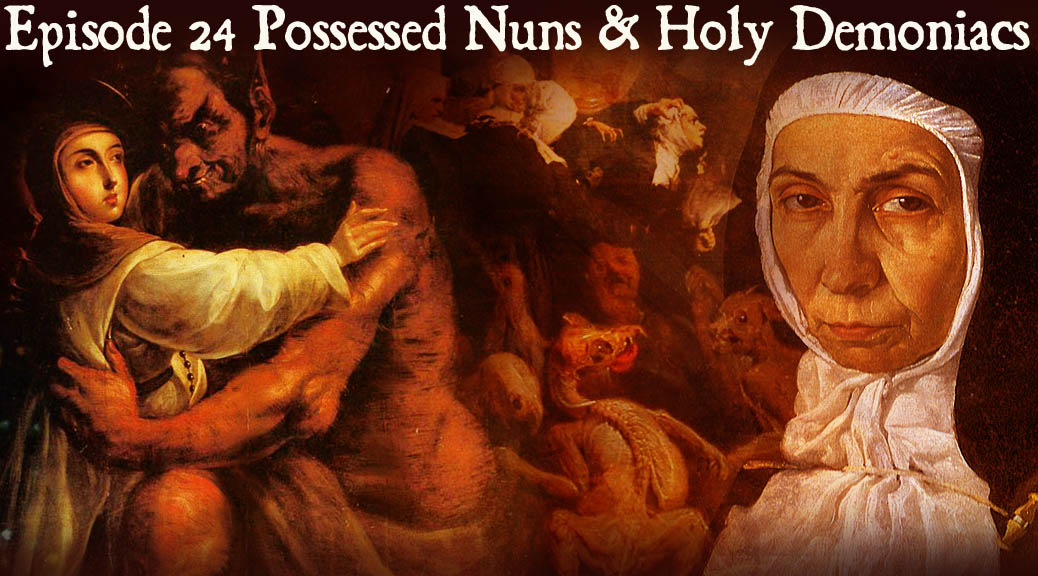
#24 Possessed Nuns and Holy Demoniacs
Podcast: Play in new window | Download (Duration: 41:10 — 37.7MB)
Subscribe: Apple Podcasts | Spotify | Android | Podchaser | RSS | More
This episode finds the Devil where you’d least expect him: stories of possessed nuns and demonic attacks on the rigorously devout.. It’s a bit of a follow-up to our last episode on Ghastly Saint Stories.
We open with a clip from the 1999 film Stigmata, in which we hear it asserted that those marked by God with the stigmata are also more likely than others to be subject to attacks by Satan. Not a great film, but these types of characters straddling the line between the holy and damned, are our subject of our episode.
Our first case is that of 19th-century South Tyrolean stigmatic Maria Theresia von Mörl. Her reputation for holiness drew tens of thousands of devout visitors, but this holy figure was also beset by by beastly manifestations, which Wilkinson details for us.

A more famous 16th-century personage bearing diabolical stigmata would be Magdalena de la Cruz, abbess of the Franciscan Convent of Santa Isabel de los Angeles outside Cordoba, Spain. We hear of her childhood, characterized by saintly (and gruesome) emulation of the Savior, her alleged miracles, and her early years as abbess, during which she instituted a particularly harsh program of mortification. She seems to have gone a bit far with a particularly presumptious miracle that lost her followers, eventually admitting to bit of a demonic involvement.

We’re getting to the famous possessed nuns of Loudun, France, but first I provide a little background on earlier demonic outbreaks in convents of 17th-century France, which seem to have set the pattern fr Loudun. Along the way, some documents recording curiously animalistic behavior of possessed nuns are briefly explored.
Our Loudun segment opens with a clip from a trailer for Ken Russel’s controversial 1971 film The Devils, which we learn was based on a 1960 play based on a 1952 nonfiction book on the subject by Aldous Huxley. We also hear a snippet from the lovely 1961 Polish film by Jerzy Kawalerowicz, Mother Joan of the Angels, which loosely adapts the Loudun story, picking up where Russel and Huxley’s narrative ends. Another Pole who interpreted the story was Christoph Penderecki, who in 1961 wrote the opera The Devils of Loudun. We hear a bit of Penderecki’s music under our account of the Loudun phenomena.

The Loudun story primarily revolves around two characters: Jeanne des Anges, Mother Superior of the convent, who becomes obsessed with Father Grandier, a parish priest with a reputation for sexual indiscretions. Des Anges, interprets erotic dreams about the priest as diabolic visitations, a fear that quickly infests the entire convent. Wilkinson reads for us an account of the extraordinary symptoms exhibited by the nuns who believed they’d been possessed. The story does not end well for Grandier, though des Anges, as we learn, goes on reporting more fantastic details of her struggle against Satan, eventually producing a strange but much coveted holy relic.
After our Loudun segment, you’ll hear a clip from the film The Exorcism of Emily Rose, and a bit later, the German film Requiem. Both are based (the former more freely) on the case of Anneliese Michel, a young Bavarian woman, who died in 1976 shortly after a series of exorcisms. We hear a bit about her psychiatric issues, which proved untreatable by conventional means, and the process of minor and later full rites of exorcism the family turned to. I’ve included Michel’s story alongside possessed nuns as Michel’s followed a similarly rigorous spiritual discipline, one which oddly became more aggressive in tandem with the growth of her “demonic” destructive and self-destructive behavior. We learn of Michel’s belief that her suffering under demonic forces served a redemptive role as penance for others and of a small, but devoted following she has drawn among Catholics who believe she was chosen by God as a “victim soul,” a concept we discussed in the last show. We also hear a snippet of disturbing tape recordings made during the exorcism. The show ends with a news story about the house in which these events took place and the strange rumors it engendered.
